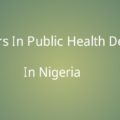Public health is defined as “the art and science of preventing disease, prolonging life and promoting health through the organized efforts of society”.
The overall vision is to promote greater health and well-being in a sustainable way while strengthening integrated public health services and reducing inequalities. In order to achieve this vision, the public health approach involves working with other sectors to address the wider determinants of health, and with health professionals: primary health care professionals can play a key role in preventing illness and promoting health, as outlined in the Alma Ata declaration.
The definition of public health is different for every person. Whether you like to crunch numbers, conduct laboratory or field research, formulate policy, or work directly with people to help improve their health, there is a place for you in the field of public health. Being a public health professional enables you to work around the world, address the health problems of communities as a whole, and influence policies that affect the health of societies.
Public health involves the application of many different disciplines:
- Biology
- Anthropology
- Public policy
- Mathematics
- Engineering
- Education
- Psychology
- Computer science
- Sociology
- Medicine
- Business
- and others.
What Is A Masters In Public Health?
A Master’s degree in Public Health is a program designed to equip students with the knowledge and skills to enable them to address public health challenges through research and practice. It covers the whole breadth of public health, encompassing low-, middle- and high-income countries. It reflects local, national, and international public health agendas, and provides the opportunity to explore public health issues in-depth with academics, researchers, and practitioners.
Masters in Public Health programs typically offer students the opportunity to choose a field of specialization within public health. The most common concentrations/tracks are the five core disciplines in public health: Biostatistics, Epidemiology, Environmental Health, Health Policy and Administration, and Social and Behavioral Sciences. However, other common public health concentrations include Community Health and Health Promotion, Maternal and Child Health, and Nutrition.
After a series of compulsory core modules, students will be able to focus on a specialized stream of study, including the option to follow a general public health program. On successful completion of the program, students will receive a Master’s degree in Public Health.
What is the difference between a Master of Science in Public Health and an MPH?
MSPH degrees train students in advanced research and prepare them for careers as researchers or educators in academic or research institutions. In contrast, the MPH is more focused on helping students develop transferable and practical skills, which can be applied in various Public Health careers.
What do public health professionals do?
As a public health professional, you will be trained to perform one or more of these ten essential services:
- Monitor the health status of a community to identify potential problems
- Diagnose and investigate health problems and hazards in the community
- Inform, educate, and empower people about health issues, particularly the underserved and those at risk
- Mobilize community partnerships to identify and solve health problems
- Develop policies and plans that support individual and community health efforts
- Enforce laws and regulations that protect health and ensure safety
- Link people to needed personal health services and ensure the provision of health care when otherwise unavailable
- Ensure a competent public health and personal health care workforce
- Evaluate effectiveness, accessibility, and quality of personal and population-based health services
- Research new insights and innovative solutions to health problems.






